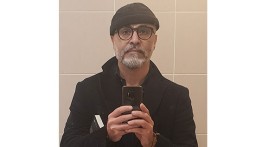Shahram Khosravi | Listening to X-rays
Saturday, March 27, 2021, 12 - 1:30pm

Since its invention in the late seventeenth century, the penetrating gaze of X-rays has changed our vision of the inside of the human body. This technology developed during the period of time that was characterized by a demand for total transparency and knowability. Used for medical diagnosis, it soon became a technique for surveillance and policing. Central to policing has been the desire for ‘seeing through’ human beings. In this experimental talk as part of the Spring 2021 Intra-Disciplinary Seminar series Shahram Khosravi will show what listening to X-ray images can tell us about bordering practices.
Shahram Khosravi is a former taxi driver and currently an accidental Professor of Anthropology at Stockholm University. Khosravi is the author of some academic books and some articles but he prefers to write stories. He has been an active writer in the international press. These days he is working on an art book on Waiting and two years ago he started Critical Border Studies, a network for scholars, artists and activists to interact
The IDS public lecture series is part of the Robert Lehman Visiting Artist Program at The Cooper Union. We are grateful for major funding from the Robert Lehman Foundation. The IDS public lecture series is also made possible by generous support from the Open Society Foundations.




